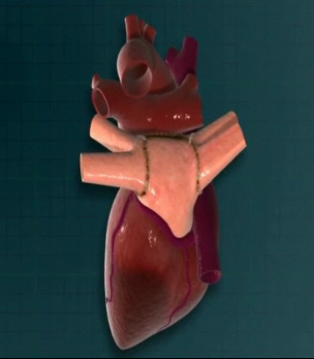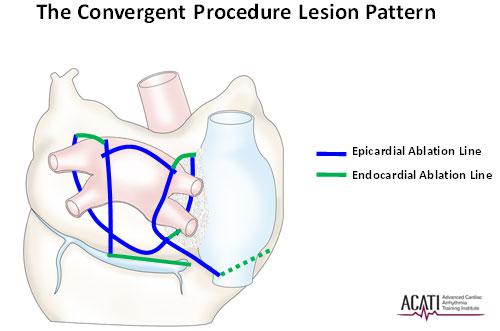| Click here to download printable PDF |
What is Atrial Fibrillation?
Atrial Fibrillation or Afib is the most common heart arrhythmia disorder. There are roughly 2.3 million people living with Afib in the US and roughly 160,000 new patients are diagnosed every year according to the Heart Rhythm Society. Atrial Fibrillation is caused by rapid electrical signals in the upper chambers of the heart (or atria) that can disrupt blood flow, causing an irregular rhythm, and can lead to stroke.
What is the Convergent Procedure?
 The Convergent Procedure is a collaborative effort between a cardiac surgeon and an electrophysiologist to effectively treat patients with chronic atrial fibrillation. The procedure utilizes radiofrequency to block irregular electrical signals by producing lesions, or scar tissue, on the heart. According to research, the convergence of technologies and expertise allows:
The Convergent Procedure is a collaborative effort between a cardiac surgeon and an electrophysiologist to effectively treat patients with chronic atrial fibrillation. The procedure utilizes radiofrequency to block irregular electrical signals by producing lesions, or scar tissue, on the heart. According to research, the convergence of technologies and expertise allows:
- A complete ablation pattern on the inside and outside of the heart.
- A minimally invasive approach without cardiopulmonary bypass.
- Intra-operative metrics to confirm procedural success.
- A shorter hospital stay, minimal discomfort, and faster recovery.
- Decreased number of repeat ablation procedures.*
Who is a candidate for the procedure?
- Patients with chronic Afib
- Patients who have not been successful with other Afib treatments
- Patients with structural heart disease
How should I prepare for the procedure?
Meals: Do not eat or drink anything after midnight the night before your procedure. If you have any medications to take in the morning, you can take them with a sip of water.
Clothing: Wear comfortable clothes to the hospital. Once you are checked in, you will be given a hospital gown to change into. Please leave all jewelry and valuables at home.
What guidelines do I need to follow after the procedure?
During your hospital stay: You will likely be in the hospital for approximately 3-4 days. You can expect to be in the Intensive Care Unit (ICU) for the first 24 hours after your procedure before being transferred to a regular room. The nurses will be monitoring your recovery so it’s important to inform them if you have prolonged or severe chest discomfort or shortness of breath. When you are discharged home, please make arrangements to have someone drive you home.
Activities at home: The first two weeks after the procedure, you will be asked to reduce any strenuous activity. After that time period, you may resume your normal activities.
Are there any complications?
After the procedure, patients may experience chest discomfort, shortness of breath, and fluid retention. Should this happen, please speak with your physician or nurse as they have methods and medication to ease these symptoms. In addition, if you start to develop a low grade temperature, redness, swelling, or drainage at the procedure site, or difficulty swallowing, please contact your physician or nurse.
CTVS Surgeon who performs the convergent procedure:

